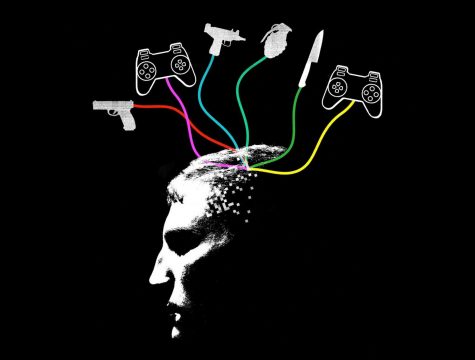Video Games DON’T make killers
Mass shootings make heads turn towards violent video games
October 4, 2018
346.
That’s the number of shootings that ended in injury or death in 2017, Las Vegas, Sutherland Springs and others. Some blaming guns and mental health, but others, violent video games.
First Person Shooters (FPS) are the target for most criticizers, exposing young children under the age restriction of 18 to violent, war themed games. Some being Halo, Destiny, Call of Duty, PUBG, Grand Theft Auto V and including the ever so popular, Fortnite that has been in the news recently.
Some information published by DigitalTrends was 91% of children in the United States play video games, while almost 85% of games contain some form of violence.
 The Learning Network
The Learning Network
CNN published an article focused on the American Psychological Association (APA) and the American Academy of Pediatrics (AAP). The APA studied a policy statement back in August of 2015, research demonstrated that there was a link that violent video games do increase aggressive behavior and decreases social interaction and empathy.
For 400 test subjects, they concluded a significant link between violence with exposure to rated “M” games (17+ age restriction). Some students, don’t believe so.
“People aren’t playing those games to be violent.” junior Gage Miskimins said. “They are playing the games to play with friends, complete an objective, and to have fun.”
A case popped up into the news recently: a 45 year old man reported threatening to break in to the 11 year olds house and murder him over a game of Fortnite.
An article published by Centre for Educational Neuroscience also backs up their theory.
Whitney DeCamp, a professor of sociology studying at the University of Western Michigan, studied 98 different cases involving almost 37,000 different participants. They seperated two different control groups, one group playing violent video games and those playing passive and non violent games.
Although, studies show some behavioural changes while playing games, like letting out large noise burts and desensitization is also another factor according to research.
But according to DeCamp, there is no real, significant link between violence and video games, but there are a lot of factors still in play, such as age. Can a 14 year old become more angry than an 18 or 30 year old? Is IQ a factor? However, another variable definitely comes into play.
Emotional triggers, a mechanism in the human mind that queues different emotions for different situations.
Being lonely and bored, you may be sad. Emotional triggers, throughout my own research, reading multiple articles and news slips that side for both sides of the argument. emotional triggers, may be the wall researchers are running into.
Science experiments are run to try to prove something, trying to minimize the manipulated variable. A variable of which changes occur, maybe in a human being, since no one is the exact same.
Some children may have experienced something traumatic, maybe like a car wreck, or the loss of a love one, may be immune to adapting violence from games.
Some of the YouTubers and Twitch streamers I watch playing non-violent games like Rocket League or FIFA are one of the most angry and prone to rage out of most of streamers.
These games are a kind of emotional trigger. One that, if the player doesn’t accomplish your objective or are defeated in a match, they get angry and upset. It applies to the other way around. If the player were to accomplish their main objective or destroy their opponent, they feel a sense of accomplishment and happiness.
A follow up to DeCamp’s studies, emotional triggers may be the feeling of letting out a loud noise burst while playing the game according to DeCamp. Scoring that goal against the team that has been beating the player, may feel very accomplishing to some, which then triggers the mind to let out large bursts of noise to release anger.
With research of my own and experience with friends and playing games, I can firmly stand by my statement, video games do not make you a violent person. Emotional triggers may change the way the player acts and interacts with different people.







